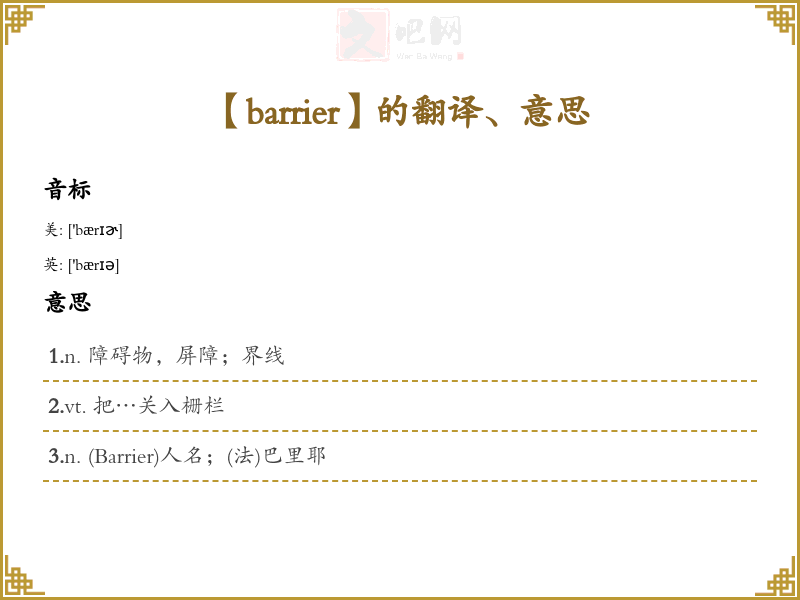【barrier】的翻译、意思
时间: 2025-04-26 13:26:39
【barrier】怎么读
美:['bærɪɚ]
英:['bærɪə]
【barrier】是什么意思、字义解释
1. n. 障碍物,屏障;界线
2. vt. 把…关入栅栏
3. n. (Barrier)人名;(法)巴里耶
【barrier】的详细解释
英文单词学*与分析:[barrier]
1. 基本定义:
- 字面意思:Barrier指的是一种阻挡或封闭的物体或结构,通常用于阻止人或物体的通过。
- 定义:Barrier是一个名词,指任何物理或非物理的障碍,妨碍或阻止某种行为、交流或**。
2. 词源与起源:
-
词源分析:Barrier来源于法语单词“barrière”,其根源是拉丁语“barrica”,意为“栅栏”或“障碍”。“bar”意指“阻挡”或“限制”。
-
历史背景:Barrier首次被使用于中世纪,通常指防御工事或用于分隔的结构。在文学中,常用于描绘人际关系或社会结构中的障碍。
-
课本:在**的英语教材中,特别是初中和高中阶段,常会出现“barrier”一词,通常用于环境、社会学或心理学的主题讨论。在牛津和美国的教材中,特别是在讨论沟通障碍或社会问题时,也常会引用该词。
3. 使用场景:
-
正式与非正式语境:
- 正式语境:在学术或商务报告中,常用于描述市场进入的障碍或政策的限制。例如,“The regulatory barriers hinder foreign investment.”(监管障碍阻碍了外资投资。)
- 非正式语境:在日常对话中,可以用来描述个人生活中的障碍。例如,“I feel like my fear of public speaking is a barrier to my career.”(我觉得我的公众演讲恐惧是我职业生涯的障碍。)
-
特殊场合:
- 法律:在法律领域,barrier可以指法律上的障碍或限制,例如,“The barrier to entry in this market is quite high.”(进入这个市场的法律障碍相当高。)
- 科学:在科学讨论中,常用来描述自然现象中的障碍,例如,“The physical barrier prevents the spread of the disease.”(物理障碍阻止了疾病的传播。)
4. 示例句子:
- The fence serves as a barrier between the two properties.
(这道围栏作为两块土地之间的障碍。) - Language can be a significant barrier in international business.
(语言可以是国际商务中的一个重大障碍。) - She faced many barriers in her pursuit of a higher education.
(她在追求高等教育的过程中面临许多障碍。) - There are barriers to communication that need to be addressed.
(需要解决的沟通障碍。) - The mountain range acts as a natural barrier to the spread of wildlife.
(这座山脉作为野生动物传播的自然障碍。)
*. Cultural barriers can lead to misunderstandings.
(文化障碍可能导致误解。) - The government is working to eliminate barriers to healthcare access.
(政府正在努力消除医疗服务获取的障碍。) - Psychological barriers can often inhibit personal growth.
(心理障碍往往会抑制个人成长。) - Trade barriers can affect the economy significantly.
(贸易壁垒可能对经济产生重大影响。) - He found it hard to break through the emotional barriers in his relationship.
(他发现很难突破他关系中的情感障碍。)
5. 同义词与反义词:
-
同义词:Obstacle(障碍),Hindrance(妨碍),Impediment(阻碍)。
- 这些词的微小差异在于:obstacle通常指实质性的物理阻碍,hindrance可以指任何导致困难的因素,而impediment更常用于法律或正式的上下文中。
-
反义词:Facilitator(促进者),Aid(帮助),Support(支持)。
- 这些词表示消除障碍的力量或因素,帮助推动事情的进展。
. 学方法:
使用词根记忆法:
- bar(阻挡)+ rier(相关后缀,表示某种状态或职位),将其联想为“某种阻挡状态”,帮助记忆。
7. 关联词汇:
- 常用词汇:communication barrier(沟通障碍),trade barrier(贸易壁垒),psychological barrier(心理障碍),physical barrier(物理障碍),cultural barrier(文化障碍)。
通过以上的分析与学*,能够更深入地理解“barrier”一词及其在不同语境中的应用。
【barrier】例句
1、[N-COUNT] A barrier is something such as a rule, law, or policy that makes it difficult or impossible for something to happen or be achieved. 障碍
-
例:Duties and taxes are the most obvious barrier to free trade.关税及其他各种税是自由贸易最明显的障碍。
2、[N-COUNT] A barrier is a problem that prevents two people or groups from agreeing, communicating, or working with each other. 障碍; 隔阂
-
例:There is no reason why love shouldn't cross the age barrier.爱情没有理由不应跨越年龄障碍。
-
例:She had been waiting for Simon to break down the barrier between them.她一直在等着西蒙来破除他们之间的隔阂。
3、[N-COUNT] A barrier is something such as a fence or wall that is put in place to prevent people from moving easily from one area to another. 栅栏; 围墙
-
例:The demonstrators broke through heavy police barriers.示威者们冲破了警方的重重关卡。
4、[N-COUNT] A barrier is an object or layer that physically prevents something from moving from one place to another. 屏障
-
例:A severe storm destroyed a natural barrier between the house and the lake.一场猛烈的暴风雨摧毁了房屋和湖泊之间的天然屏障。
5、[N-SING] You can refer to a particular number or amount as a barrier when you think it is significant, because it is difficult or unusual to go above it. (数量) 大关
-
例:They are fearful that unemployment will soon break the barrier of three million.他们担心失业人数不久将突破300万大关。
